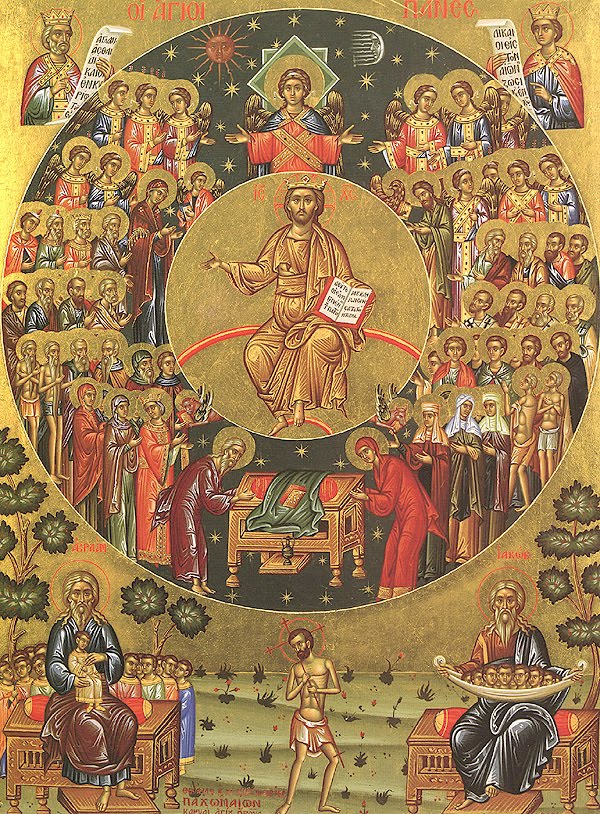December 4-5, 2010
Advent 2
Luke 21:25-36
In the Name of the Father and of the + Son and of the Holy Spirit. Amen.
The sun, the moon, and the stars were placed into the heavens on the fourth day of creation. God gave them to men. He gave them to be lights upon the earth for all living creatures, but for men they were appointed also for signs and for seasons, for days and years. They mark time. They found their grandest fulfillment, their greatest sign and time marking, in drawing the magi from Babylon to Bethlehem to worship the Virgin's Son.
The Virgin's Son is Lord of the stars. He again invokes them as markers measuring the time of His delay. Every sunset is a reminder of our impending death. But every sunrise is a promise of the resurrection to come. The rotation of the heavens, the waxing and waning of the earth's most significant satellite, are predictable. So also is the return of the King to the place of His anointing. Not that we know the exact day and time of His return. But what we can predict with absolute certainty is that as sure as there are stars in the sky Jesus is coming back. Every moment He is postponed the tension grows greater.
Look and see if the sun still shines. Look and see if nations are distressed with perplexity, the sea and the waves are still roaring, men's hearts failing them from fear. Know then that Day draws ever near. Time is not without an end. It will not continue forever. The Son of Man will come in a cloud with power and great glory. Watch therefore, and pray.
We pray: “Stir up our hearts, O Lord.” But that is a dangerous prayer. For hearts are stirred up not with comfort foods and soft music. We do not pray: “Lord give us a warm, fuzzy feeling in our bellies, make our lives comfortable and leisurely, make us popular with the boys and girls.” We pray that God would stir up our hearts, that He would disturb us, prod us into action. Hearts are stirred up by an earnest call again to repentance, with a hearty dose of reality. “Stir up our hearts” is a plea for God to end our complacency, defeat our laziness, and stop our melancholy depression. We ask Him to intervene for us against our wiliest foe, ourselves, and on the most dangerous battlefield of all, our hearts.
For while the Bridegroom delays our danger increases. We must continue to endure temptation. Salvation is closer now then when we first believed. But do we have the same zeal we had then? It is easy to grow weary and to be seduced by the devil's promise of rest. “Why fight it? Why work so hard? Why care about what God says when it seems as though He doesn't care for you?” The devils advises: “Take care of yourself. Don't offend anyone but lay up for yourself treasures where you can see and enjoy them.”
But that is most certainly the way of death. Stir up, O Lord, our hearts against our flesh! Man does not live by statistics and financial reports. He does not find favor in the eyes of God by finding favor in the eyes of men. The Baptized live by every word that proceeds from the mouth of God. And there, O Baptized and alive in Christ, is your safe harbor. All other things will wash away. Nothing else will endure. But the Word of God will. It never lies, never changes, never stops, never fails.
And thus we pray: “Stir up our hearts, O Lord, to make ready the way of Your only-begotten Son.” On the great and dreadful day of the Lord the Son of Man will indeed come in a cloud with power and great glory. The Mohammedans, the Buddhists, those trapped in the cults of the Jehovah's witnesses and Mormonism, and all those who thought they could come to God apart from the Son, will no longer be able to deny His power and authority. Kiss the Son lest He be angry. Satan's many masks and false names will finally be stripped away. Then the pagans and heathen will know whom they've been worshiping all these years, and they shall be burned up. But to you who fear the Name of the Lord, who trust in the mercy of the God of Abraham born of Mary, He, the Sun of Righteousness shall arise with healing in His wings. Look up. Lift up your heads. Your redemption draws near. Your suffering, your trials, your troubles end.
The decisive battle for your soul was fought outside Jerusalem. The Father has pardoned you for the death of His innocent Son. The Spirit of the resurrection abides in you. The war rages on. Casualties pile up. It is dangerous, deadly. But the end is certain. Fear not. The Christ has not died in vain. The devil is a liar, already defeated. Jesus died and rose again for us men and for our salvation. He reconciled all mankind to His Father and the kingdom of heaven is open to all believers. Blessed are all those who trust in Him, who rest in Him, who confess Him. They shall not be disappointed.
Stir up our hearts, O Lord! Prepare us by Your grace. Receive us now and when we die through forgiveness and mercy. Secure us in this free salvation unto the end. Feed us with your Body and Blood. Make us your own!
In + Jesus' Name. Amen.
